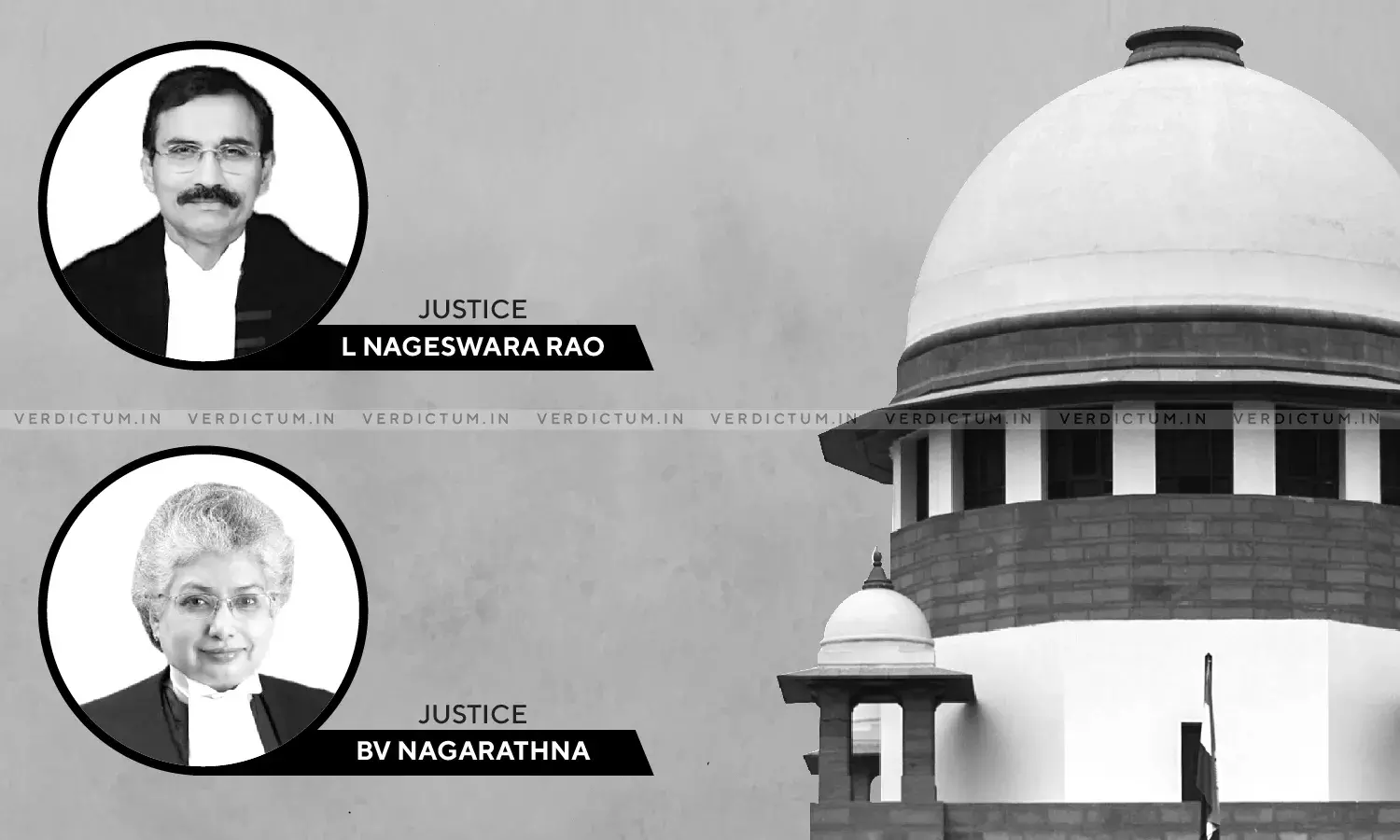Genuineness Of Will Must Be Proved By Proving Intention of Testator To Make The Testament: Supreme Court

A Bench of the Supreme Court consisting of Justice L. Nageswara Rao and Justice BV Nagarathna has ruled that the genuineness of a Will must be proved by proving the intention of the testator to make the testament and for that, all steps which are required to be taken for making a valid testament must be proved by placing concrete evidence before the Court.
Relying on Section 63 of the Indian Succession Act, 1925, the Bench explained that, "the testator has to sign on the will and the signature of the testator must be such that it would "intend" thereby to give effect to the writing of a will."
The Bench further stated, "Section 63(c) of the Indian Succession Act, 1925, firstly states that the will has to be attested by two or more witnesses/attestators, each of whom should have seen the testator sign on the will in his presence, or has received from the testator, a personal acknowledgment of his signature on the will."
The Bench added, "each of the witnesses shall sign on the will in the presence of the testator but it shall not be necessary that more than one witness be present at the same time, and no particular form of attestation is necessary. The aforesaid two mandatory requirements have to be complied with for a testament to be valid from the point of view of its execution."
In this case, the heirs of the deceased son filed a suit before the High Court seeking Letters of Administration by producing the Will of the father. The plaintiffs filed the suit after the daughters of the deceased testator filed suit for partition and separation of the property mentioned in the Will. The Single Bench dismissed the suit by observing that the execution of the will is itself suspicious and the evidence regarding execution of the will has not dispelled the suspicious circumstances.
The Division Bench of the High Court reversed the judgment and observed thus, "Section 68 of the Indian Evidence Act, 1872, has to be complied with to establish proof of the will, noted that 17 only one of the attesting witnesses, namely, Varadan was examined as PW2, as the other attesting witness, namely, Dakshinamurthy was not alive to be examined so as to corroborate the genuineness of the will which is permissible in law."
Therefore the Defendants assailed the High Court's judgment before the Supreme Court. Advocate Anupam Lal Das represented the Appellants while Advocate Ajay Sharma appeared for Respondents.
The Supreme Court referred to a catena of judgments related to execution of Will and responsibilities of the parties on leading evidence to establish genuineness of the Will.
While referring to the judgment in the case of H.Venkatachala Iyenger vs. B.N.Thimmajamma, the Bench observed that the legal principles with regard to the proof of a Will are no longer res integra. Section 63 of the Indian Succession Act, 1925 and Section 68 of the Evidence Act, 1872, are relevant in this regard.
"The propounder of the will must examine one or more attesting witnesses and the onus is placed on the propounder to remove all suspicious circumstances with regard to the execution of the will," the Bench observed.
While referring to the judgment in the case of Jaswant Kaur v. Amrit Kaur and others, the Bench mentioned that, "When a will is allegedly shrouded in suspicion, its proof ceases to be a simple lis between the plaintiff and the defendant. What generally is an adversarial proceeding, becomes in such cases, a matter of the Court's conscience and then, the true question which arises for consideration is, whether, the evidence let in by the propounder of the will is such as would satisfy the conscience of the Court that the will was duly executed by the testator. It is impossible to reach such a satisfaction unless the party which sets up the will offers cogent and convincing explanation with regard to any suspicious circumstance surrounding the making of the will."
The Bench reproduced the suspicious circumstances as narrated in the judgment in case of Bharpur Singh and others v. Shamsher Singh thus, "(i) The signature of the testator may be very shaky and doubtful or not appear to be his usual signature. (ii) The condition of the testator's mind may be very feeble and debilitated at the relevant time. (iii) The disposition may be unnatural, improbable or unfair in the light of relevant circumstances like exclusion of or absence of adequate provisions for the natural heirs without any reason. (iv) The dispositions may not appear to be the result of the testator's free will and mind. (v) The propounder takes a prominent part in the execution of the will. (vi) The testator used to sign blank papers. (vii) The will did not see the light of the day for long. (viii) Incorrect recitals of essential facts."
After considering the facts of the case, the Bench set aside the High Court's judgment by observing that the suspicious circumstances around the execution of Will were not cleared.
"We hold that the respondents-plaintiffs have not been successful in proving the validity of the will in accordance with law inasmuch as the suspicious circumstances surrounding the very execution of the will have not been cleared by any cogent evidence, rather, the genuineness of Ex-P1 remains in doubt. It is observed that the will (Ex-P1) did not come into existence at the instance of the testator but it is a concocted document and has been got up after the demise of S. Damodaran (husband of the original Plaintiff)." the Bench concluded.
Case Title: Murthy & Others Versus C. Saradambal & Others
Click Here to Read/Download the Judgment

